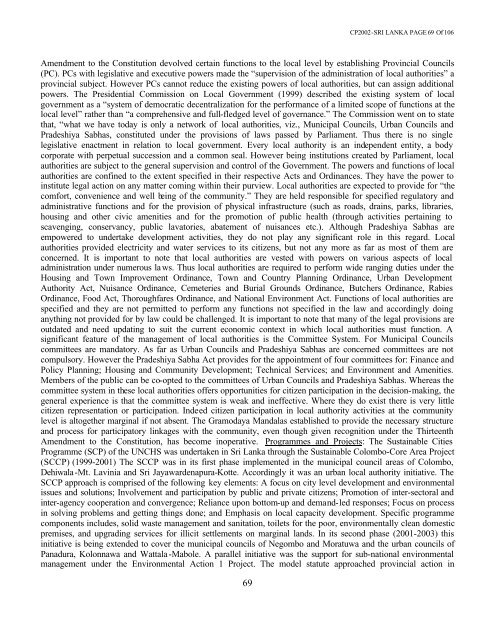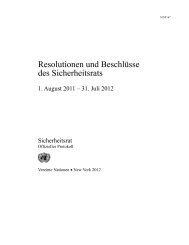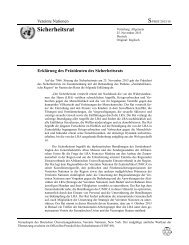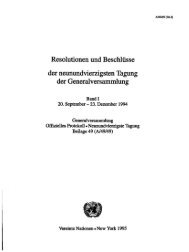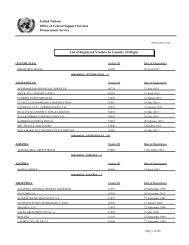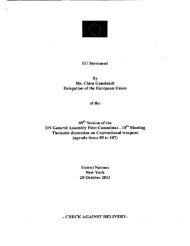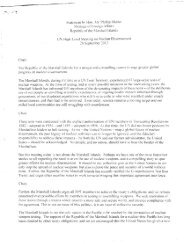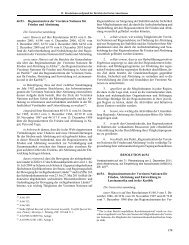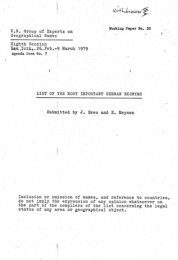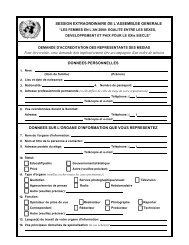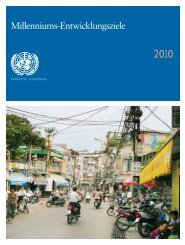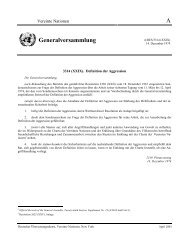SRI LANKA COUNTRY PROFILE
SRI LANKA COUNTRY PROFILE
SRI LANKA COUNTRY PROFILE
Create successful ePaper yourself
Turn your PDF publications into a flip-book with our unique Google optimized e-Paper software.
69<br />
CP2002-<strong>SRI</strong> <strong>LANKA</strong> PAGE 69 Of 106<br />
Amendment to the Constitution devolved certain functions to the local level by establishing Provincial Councils<br />
(PC). PCs with legislative and executive powers made the “supervision of the administration of local authorities” a<br />
provincial subject. However PCs cannot reduce the existing powers of local authorities, but can assign additional<br />
powers. The Presidential Commission on Local Government (1999) described the existing system of local<br />
government as a “system of democratic decentralization for the performance of a limited scope of functions at the<br />
local level” rather than “a comprehensive and full-fledged level of governance.” The Commission went on to state<br />
that, “what we have today is only a network of local authorities, viz., Municipal Councils, Urban Councils and<br />
Pradeshiya Sabhas, constituted under the provisions of laws passed by Parliament. Thus there is no single<br />
legislative enactment in relation to local government. Every local authority is an independent entity, a body<br />
corporate with perpetual succession and a common seal. However being institutions created by Parliament, local<br />
authorities are subject to the general supervision and control of the Government. The powers and functions of local<br />
authorities are confined to the extent specified in their respective Acts and Ordinances. They have the power to<br />
institute legal action on any matter coming within their purview. Local authorities are expected to provide for “the<br />
comfort, convenience and well being of the community.” They are held responsible for specified regulatory and<br />
administrative functions and for the provision of physical infrastructure (such as roads, drains, parks, libraries,<br />
housing and other civic amenities and for the promotion of public health (through activities pertaining to<br />
scavenging, conservancy, public lavatories, abatement of nuisances etc.). Although Pradeshiya Sabhas are<br />
empowered to undertake development activities, they do not play any significant role in this regard. Local<br />
authorities provided electricity and water services to its citizens, but not any more as far as most of them are<br />
concerned. It is important to note that local authorities are vested with powers on various aspects of local<br />
administration under numerous laws. Thus local authorities are required to perform wide ranging duties under the<br />
Housing and Town Improvement Ordinance, Town and Country Planning Ordinance, Urban Development<br />
Authority Act, Nuisance Ordinance, Cemeteries and Burial Grounds Ordinance, Butchers Ordinance, Rabies<br />
Ordinance, Food Act, Thoroughfares Ordinance, and National Environment Act. Functions of local authorities are<br />
specified and they are not permitted to perform any functions not specified in the law and accordingly doing<br />
anything not provided for by law could be challenged. It is important to note that many of the legal provisions are<br />
outdated and need updating to suit the current economic context in which local authorities must function. A<br />
significant feature of the management of local authorities is the Committee System. For Municipal Councils<br />
committees are mandatory. As far as Urban Councils and Pradeshiya Sabhas are concerned committees are not<br />
compulsory. However the Pradeshiya Sabha Act provides for the appointment of four committees for: Finance and<br />
Policy Planning; Housing and Community Development; Technical Services; and Environment and Amenities.<br />
Members of the public can be co-opted to the committees of Urban Councils and Pradeshiya Sabhas. Whereas the<br />
committee system in these local authorities offers opportunities for citizen participation in the decision-making, the<br />
general experience is that the committee system is weak and ineffective. Where they do exist there is very little<br />
citizen representation or participation. Indeed citizen participation in local authority activities at the community<br />
level is altogether marginal if not absent. The Gramodaya Mandalas established to provide the necessary structure<br />
and process for participatory linkages with the community, even though given recognition under the Thirteenth<br />
Amendment to the Constitution, has become inoperative. Programmes and Projects: The Sustainable Cities<br />
Programme (SCP) of the UNCHS was undertaken in Sri Lanka through the Sustainable Colombo-Core Area Project<br />
(SCCP) (1999-2001) The SCCP was in its first phase implemented in the municipal council areas of Colombo,<br />
Dehiwala-Mt. Lavinia and Sri Jayawardenapura-Kotte. Accordingly it was an urban local authority initiative. The<br />
SCCP approach is comprised of the following key elements: A focus on city level development and environmental<br />
issues and solutions; Involvement and participation by public and private citizens; Promotion of inter-sectoral and<br />
inter-agency cooperation and convergence; Reliance upon bottom-up and demand-led responses; Focus on process<br />
in solving problems and getting things done; and Emphasis on local capacity development. Specific programme<br />
components includes, solid waste management and sanitation, toilets for the poor, environmentally clean domestic<br />
premises, and upgrading services for illicit settlements on marginal lands. In its second phase (2001-2003) this<br />
initiative is being extended to cover the municipal councils of Negombo and Moratuwa and the urban councils of<br />
Panadura, Kolonnawa and Wattala -Mabole. A parallel initiative was the support for sub-national environmental<br />
management under the Environmental Action 1 Project. The model statute approached provincial action in


